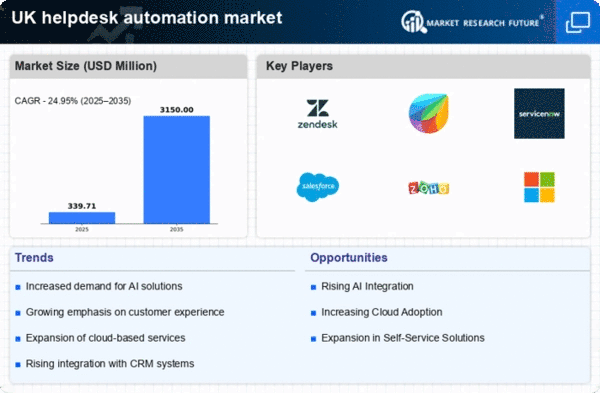Growing Emphasis on Data Analytics
The growing emphasis on data analytics is emerging as a key driver in the helpdesk automation market. UK organisations are increasingly recognising the value of data-driven insights in enhancing their customer support strategies. By analysing customer interactions and feedback, businesses can identify trends, pain points, and areas for improvement. This analytical approach enables organisations to refine their helpdesk automation solutions, ensuring they meet customer needs more effectively. Data indicates that companies utilising analytics in their support processes can improve resolution times by up to 25%. As the importance of data analytics continues to rise, it is likely to propel the growth of the helpdesk automation market, as organisations seek to leverage insights for better decision-making.
Integration of Multi-Channel Support
The integration of multi-channel support is becoming a pivotal driver in the helpdesk automation market. UK businesses are increasingly adopting solutions that allow them to engage with customers across various platforms, including social media, email, and live chat. This trend is indicative of a broader shift towards omnichannel strategies, where seamless communication is paramount. Data suggests that companies utilising multi-channel support experience a 30% increase in customer retention rates. By automating responses across these channels, organisations can ensure consistent messaging and quicker resolutions. This integration not only enhances the customer experience but also optimises internal workflows, thereby driving the growth of the helpdesk automation market.
Cost Reduction and Operational Efficiency
Cost reduction and operational efficiency are critical factors influencing the helpdesk automation market. UK organisations are under constant pressure to minimise expenses while maximising productivity. Automation technologies enable businesses to reduce the need for extensive human resources in customer support roles, leading to significant cost savings. Reports indicate that companies can save up to £1 million annually by implementing automated helpdesk solutions. Furthermore, these technologies streamline processes, allowing support teams to focus on more complex issues that require human intervention. As a result, the drive for cost efficiency is likely to continue fuelling the growth of the helpdesk automation market, as organisations seek to balance quality service with financial prudence.
Advancements in Natural Language Processing
Advancements in natural language processing (NLP) are significantly impacting the helpdesk automation market. UK businesses are increasingly leveraging NLP technologies to enhance their customer interactions. These advancements allow automated systems to understand and respond to customer inquiries in a more human-like manner, improving the overall user experience. The ability to process and analyse large volumes of data enables organisations to provide tailored responses, thereby increasing customer satisfaction. As NLP technology continues to evolve, it is expected to play a crucial role in shaping the future of the helpdesk automation market, as companies strive to create more intuitive and responsive support systems.
Rising Demand for Efficient Customer Support
The helpdesk automation market is experiencing a notable surge in demand for efficient customer support solutions. Businesses in the UK are increasingly recognising the necessity of providing timely and effective assistance to their customers. This trend is driven by the growing expectation for instant responses and resolutions. According to recent data, approximately 70% of UK consumers prefer self-service options for basic inquiries, which indicates a shift towards automated solutions. As a result, companies are investing in helpdesk automation technologies to streamline their support processes, reduce response times, and enhance customer satisfaction. This rising demand is likely to propel the growth of the helpdesk automation market, as organisations seek to optimise their operations and meet evolving customer expectations.
















